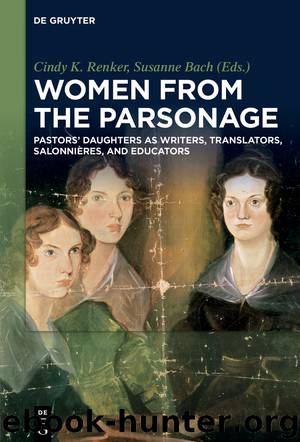Women from the Parsonage by Susanne Bach & Cindy K. Renker

Author:Susanne Bach & Cindy K. Renker [Susanne Bach]
Language: eng
Format: epub
Publisher: De Gruyter
Published: 2019-02-18T16:00:00+00:00
The Educational Concept of a Neptunist
While the travel journal was not published until the end of the nineteenth century, Briefe einer Curländerinn181 appeared only two years after Sophie’s death. In the foreword addressed to Duchess Dorothea of Courland, Schwarz explains the key concern of his deceased wife: “The author, whose favorite idea was to serve her gender by teaching in an educational institute, wanted this idea [her publication] as a ‘text book’ for educating the hearts of young women.”182 (BC) In line with this intention, Sophie Schwarz smoothed over the narrative heterogeneity of the travel journal and reduced the number of anecdotes. The author then directed her thoughts to a fictional pen friend called Agnes, to whom, in her very first letter, she explains in detail how she sees the role and task of women in society. From these fundamental considerations, it becomes clear that the experience gained on her journey to Germany led to ostensibly modern views of gender relations: “In my opinion, among the two genders, education and morals have played a larger difference than nature itself”.183 (BC: I, 4) However, this sociological perspective does not call for an appropriation of male privileges. Sophie Schwarz does not believe in the feasibility of abrupt changes; as a matter of fact, she sees the developmental potential for women in creating small arenas of freedom within the existing gender order. Instead of complaining about the ‘burdens’ posed on women by the “present bourgeois constitution,” the reasonable woman should “be able to bear this as best she can,” which ultimately means, “practicing patience”.184 (I, 5) Sophie pleads openly for complying with what – at least for the time being – cannot be changed. Since women’s activities are primarily carried out seated, women should familiarize themselves at an early age (I, 6) by working with a needle and distaff. The “truly diligent fulfillment of our female role”185 must have priority over all other ambitions.
Nevertheless, in spite of such acquiescence, the idea of a different gender order and a different society is very much alive in Sophie’s thoughts. She warns fellow women not to give up all hope; in truth “we [women], as reasonable human beings, have to also lift our gaze beyond the for us predetermined place in this world”186 (I, 6). Wherever a woman can advance the “education of the spirit,” she must seize this possibility “of climbing the moral ladder”187 (I, 6). As far as the emancipation of the female gender is concerned, to use the words of Goethe, Sophie is not a volcanist, but a neptunist. She advises her readers against taking radical women as role models “which through a special fate or intellectual gifts are torn out of the customary determination” of the female sex: “What is a virtue for some, can be a mistake for you!” (I, 7)188 We do not know why a young woman, who is interested in male-connoted topics, such as the organisation of the state, the principles of jurisdiction, literature, music and art conceived of such a pragmatic concept of female education.
Download
This site does not store any files on its server. We only index and link to content provided by other sites. Please contact the content providers to delete copyright contents if any and email us, we'll remove relevant links or contents immediately.
Still Me by Jojo Moyes(11266)
On the Yard (New York Review Books Classics) by Braly Malcolm(5525)
A Year in the Merde by Stephen Clarke(5430)
Eleanor Oliphant Is Completely Fine by Gail Honeyman(5282)
The Bookshop by Penelope Fitzgerald(3853)
How Music Works by David Byrne(3270)
Surprise Me by Kinsella Sophie(3113)
Pharaoh by Wilbur Smith(2993)
Why I Write by George Orwell(2955)
A Column of Fire by Ken Follett(2613)
Churchill by Paul Johnson(2587)
The Beach by Alex Garland(2561)
The Songlines by Bruce Chatwin(2555)
Aubrey–Maturin 02 - [1803-04] - Post Captain by Patrick O'Brian(2306)
Heartless by Mary Balogh(2259)
Elizabeth by Philippa Jones(2205)
Hitler by Ian Kershaw(2198)
Life of Elizabeth I by Alison Weir(2086)
Harry Potter and the Cursed Child by J. K. Rowling & John Tiffany & Jack Thorne(2064)
